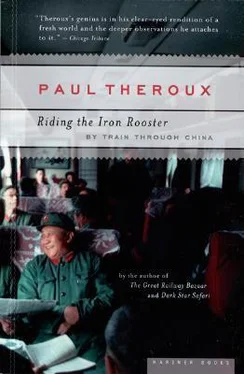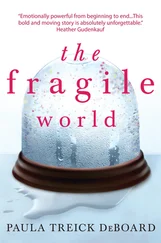It seemed to me that railway lines like this needed a little variation. It was almost as if these hills and villages had been seen by so many people passing by that they had been worn away from being looked at. One of the attractions of China to me was that it had been closed to outsiders for such a long time that even the most hackneyed sight of a pagoda would seem fresh, and in distant Xinjiang a traveler might feel like Marco Polo, because no foreigner had been there for years. But this part of heavily traveled France had been rubbed away by the eyes of sightseers and railway passengers: most landscapes near busy railway lines had that same look of simplification, as if in a matter of time they would disappear from being looked at so much.
The people on the tour were still getting acquainted with each other. They asked me questions, too. Where was I from? What did I do? Was I married? Did I have children? Why was I taking this trip? What was that book in my lap? What were my plans in Paris? First time in China?
I was Paul, I was unemployed, I was evasive, and — how does Baudelaire put it? — "The real travelers are those who leave for the sake of leaving," and something about not knowing why but always saying Allons! An appropriate sentiment here in the environs of Amiens.
What I wanted to reply to these questions was something I heard a man say to an inquisitive woman at a dinner party in London.
"Please don't ask," he said softly."I don't have anything interesting to tell you. I've made a terrible mess of my life."
What kept me from saying that was that it was a sad memory, because about six months later that man killed himself. It seemed unlucky, and unkind to his memory, to repeat it.
The sad man called Blind Bob fumbled with the flap of his valise — his eyesight was terrible: his nose was against the hasp — and brought out two rolls of toilet paper.
People asked him what it was for — surely not Europe?
"For China," he said.
I decided not to say that the great sinologist Professor Joseph Needham had proven that the Chinese invented toilet paper. In the fourteenth century they were making perfumed toilet paper (it was three inches square) for the Imperial family, and everyone else used any paper they could lay their hands on. But some Chinese knew where to draw the line. In the sixth century a scholar, Yen Chih-t'ui, wrote, "Paper on which there are quotations or commentaries from the Five Classics or the names of sages, I dare not use for toilet purposes."
Ashley Relph said, "He's taking bog-roll to China!"
Mr. Cathcart said, "I think they've heard of loo paper in China."
"Sure, they've heard of it. Lots of people have heard of it. But do they have any, is the question. I'll bet they don't have any on the Trans-Siberian, and how much do you think they'll have in Mongolia, huh?"
No one was laughing at Blind Bob now. The thought of crossing Asia without toilet paper made everyone thoughtful; there was a sort of hum of reflection in the carriage after he had spoken.
We came to Paris and were met by a bus and brought to a hotel. This was in the 14th arrondissement, near the end of the Métro line, in a district that was indistinguishable from the outskirts of Chicago or South Boston. It was mainly postwar apartment blocks that had once been light stucco and were now gray. There were too many of them, and they were too close together, and people said: Is this Paris? Is this France? Where's the Eiffel Tower? The center of Paris is a masterpiece of preservation, but the suburbs such as this one are simple and awful. The brutal pavements and high windows of St.-Jacques seemed designed to encourage suicide.
Then I was told ("funnily enough") that Samuel Beckett lived in one of those apartment houses and indeed had been in it for years. That was where he wrote his stories and plays about the sheer pointlessness and utter misery of human existence. I thought, No wonder! I was told that he often came over to our hotel, the Hôtel St.-Jacques, to have a morning coffee. The hotel was a newish spick-and-span place that resembled the lonely hotels that are found just outside American airports, where people stay because there is nowhere else. Beckett came here for pleasure?
I walked the streets, I lurked in the coffee shop, I prayed for him to appear; but, nothing. It was a lesson though. When people read Samuel Beckett lives in exile in Paris they did not know that it meant a poky little apartment on the fifth floor of No. 32—a tall gray building in which residents waited for Godot by watching television. And it was a dozen stops on the Métro from the center of Paris, the Left Bank, the museums.
We went to the Jeu de Paume, the museum devoted to the Impressionists. I wandered behind the group, listening and looking at pictures.
In a room full of Sisleys, Richard Cathcart said, "I don't like any of these."
We passed Monet's series of Rouen Cathedral, bluish and purply and rose tinted.
"Now I would not mind having something like them in my home," Mrs. Wittrick said, and the Gurneys agreed and said they'd like to cart them back to Tasmania, except that they'd probably be arrested!
Of Rousseau's La Guerre. La Chevauchée de la Discorde, Rick Westbetter said, "Hey, I like these. These are good. These are more like American pictures."
A child staggering behind his parents in the Van Gogh room said, "But why was he mad?"
A little crowd formed around a Monet of Venice.
Bud Wittrick was saying, "That's the Grand Canal. That's Saint Mark's. That's where the Bridge of Sighs is — down that canal. And see, that's the hotel we stayed at. Of course it wasn't a hotel in those days. That's where we walked, and there's where we had the spaghetti, that's where I bought the postcards."
It rained, it snowed, and the snow silenced both pedestrians and traffic. Early one morning we left for Berlin.
It was a wet, black morning in Paris, the street sweepers and milkmen doing their solitary rounds by the light of the street lamps, and just as dawn broke over the eaves and chimney pots we plodded out of the Gare de l'Est. I thought we had left the suburbs behind in the Rue St.-Jacques, but there were more, and they were deeper and grimmer. The people in the group, with their faces at the windows of the train, were shocked and disillusioned. It wasn't gay Paree, it wasn't even Cleveland. The Americans looked very closely. We were unused to this. We put up suburbs too quickly and cheaply for them to wear well. We expected them to decline and collapse and be replaced; they weren't built to last, and they look temporary because they are temporary. But French suburbs — villas, terrace houses and apartment blocks — are solid and fairly ugly, and their most horrific aspect is that they look as though they will last forever. It had been the same in outer London: How could houses so old look so awful?
'That was a battlefield," Morris said, as we crossed into Belgium. He had been telling war stories since we crossed the Channel. "Some buddies of mine died there."
"— And over there, too," Morris said, looking at a map, and meaning more dead buddies in a wartime battlefield.
He was smirking at the bare trees, the young poplars standing like switches and whips; the dark sludge and stained froth in the black canals.
I was still reading Sinclair Lewis and scribbling notes on the flyleaf.
"Making notes?" Mrs. Wittrick said.
I denied it.
"Keeping a diary?"
I said no.
I hated being observed. One of the pleasures of travel is being anonymous. I had not realized how everyone was conspicuous in a group, and the person who kept to himself was a threat. I decided to make notes on those big blank postcards that look like filing cards.
Читать дальше












